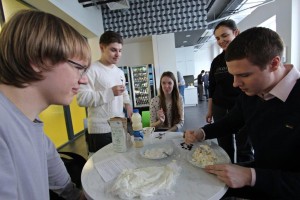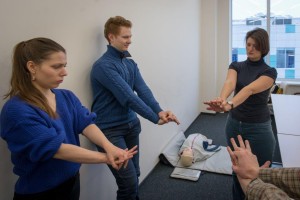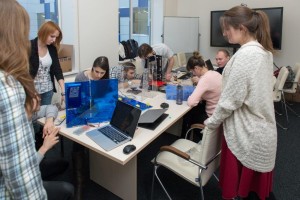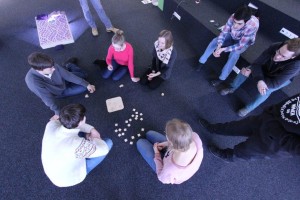We have fully equipped classes and state-of-the-art labs here in Skoltech, but in January they were just not right for one course. The kitchen was the only room suitable for the “Science and Cooking” class. And this is perhaps the best illustration for the Independent Study Period (or ISP) – everything but the usual routine of the academic year.
The ISP is a three-week term in January during which faculty and students are freed from the rigors of regularly scheduled classes for flexible teaching and learning experiences, research, and independent study. All members of the Skoltech community (e.g., students, faculty, staff, Founding Faculty Fellows, alums, visiting faculty/staff/experts, etc.) are encouraged to create courses, seminars, workshops, etc. aimed at sharing an expertise or
interest with others, including ones not necessarily related to their day-to-day Skoltech roles.
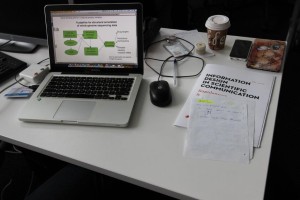
Planning the next presentation in the “Informational and graphic design in scientific communication” class.
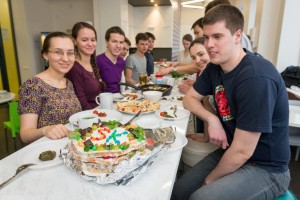
Try to eat your presentation in “German language crash course”. In “Science and Cooking” course it’s part of the fun.
This year the variety stretched from “German language crash course”, through “La Nouvelle Vague”, ”Speech culture“, “Toy Product Design” and “Stock Trading Course” to “Build your own 3D printer”. Most of the teachers were actually the students themselves, and this for itself was a good lesson for life, since it gave them the chance to practice the skill of organizing an event or class.
Kseniya Ershova, a master student in the biomedical science and technology program, explains why she decided to teach first aid and emergency medicine: “This course teaches how to perform lungs and heart reanimation. It is very important for every person, because nobody knows in what situation you can be caught”. Aleksandra Sveshnikova, a PhD student at the energy systems department, chose to get herself and her students lost in Moscow, in an outdoor course, surprisingly called “How to get lost in Moscow”.
“The goal of the course was to explore interesting and hidden places in Moscow with brief historical background”, she says, “Many Skoltech students do not have much time to explore the city and this course helped them not just visit new places, but also recognize architecture styles, origin of a building or a monument. I’ve seen many foreign people who had wrong impression about our country and through this course I tried to break common misconceptions and open the real beauty of the city”.
There are other reasons for the teaching-students to offer their courses, but what makes the learning-students to choose a course out of the offered wide variety? Let’s take students who attended the “Informational and graphic design in scientific communication” course for example. “I chose this course basically because of the people who teach it. These are people who have their own design company, one of them is the art director of the company. It seems to be very useful and cool, high level of stuff”, says Denis Vetsler, a student in the photonics and quantum materials track, pointing out the fact that not only students teach courses during ISP.
“I’m a PhD Student, and I don’t have to take any ISP courses. I’m here because I’m a scientist, and I want to make really cool presentations. I think I do a cool research, and I want people to really understand what I’m doing and I think that this course will help me to deliver the information to people”, says Anastasia Naumova, another student from the product design and advanced manufacturing program.
When asked to share their impression from the course itself, they answer with no hesitation: “During the lessons I see that what I learn and what I hear from the teachers is very useful for me”, says Vetsler, and Naumova states “This course is cool!”.
